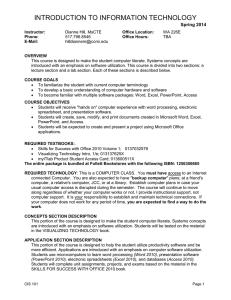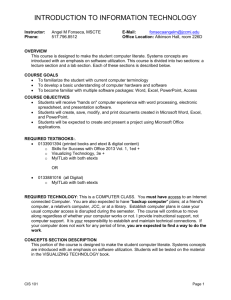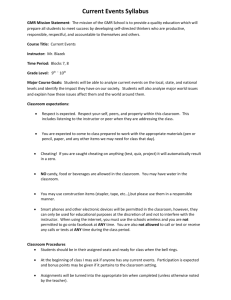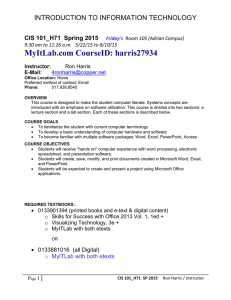CIS.101.H1 - Jackson College
advertisement
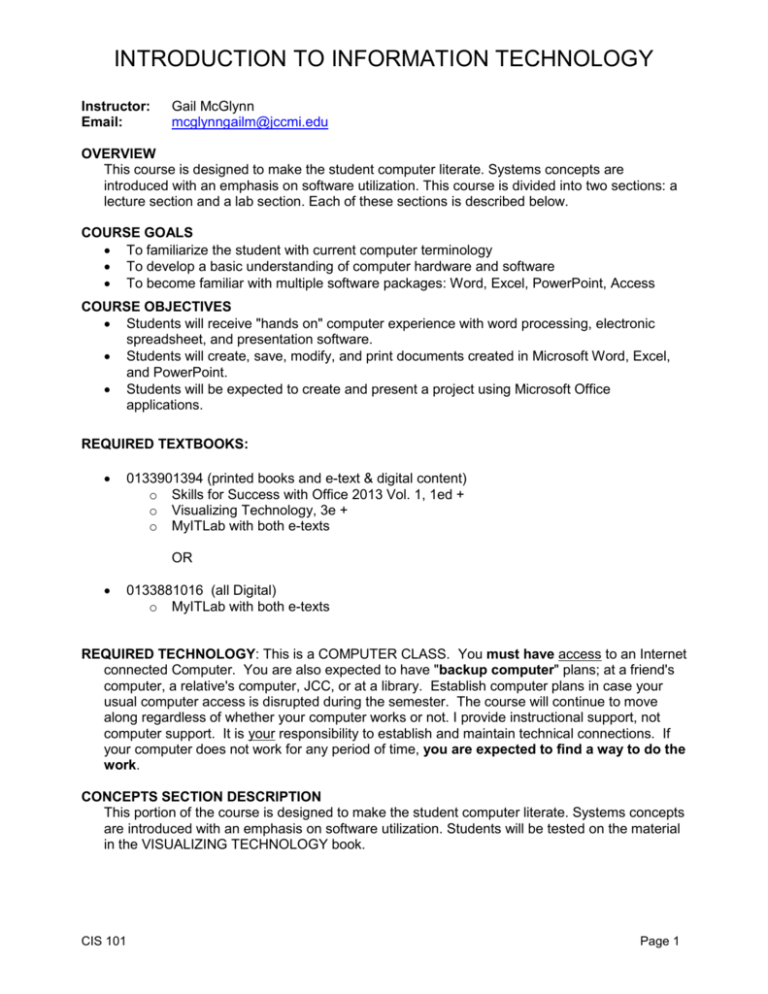
INTRODUCTION TO INFORMATION TECHNOLOGY Instructor: Email: Gail McGlynn mcglynngailm@jccmi.edu OVERVIEW This course is designed to make the student computer literate. Systems concepts are introduced with an emphasis on software utilization. This course is divided into two sections: a lecture section and a lab section. Each of these sections is described below. COURSE GOALS To familiarize the student with current computer terminology To develop a basic understanding of computer hardware and software To become familiar with multiple software packages: Word, Excel, PowerPoint, Access COURSE OBJECTIVES Students will receive "hands on" computer experience with word processing, electronic spreadsheet, and presentation software. Students will create, save, modify, and print documents created in Microsoft Word, Excel, and PowerPoint. Students will be expected to create and present a project using Microsoft Office applications. REQUIRED TEXTBOOKS: 0133901394 (printed books and e-text & digital content) o Skills for Success with Office 2013 Vol. 1, 1ed + o Visualizing Technology, 3e + o MyITLab with both e-texts OR 0133881016 (all Digital) o MyITLab with both e-texts REQUIRED TECHNOLOGY: This is a COMPUTER CLASS. You must have access to an Internet connected Computer. You are also expected to have "backup computer" plans; at a friend's computer, a relative's computer, JCC, or at a library. Establish computer plans in case your usual computer access is disrupted during the semester. The course will continue to move along regardless of whether your computer works or not. I provide instructional support, not computer support. It is your responsibility to establish and maintain technical connections. If your computer does not work for any period of time, you are expected to find a way to do the work. CONCEPTS SECTION DESCRIPTION This portion of the course is designed to make the student computer literate. Systems concepts are introduced with an emphasis on software utilization. Students will be tested on the material in the VISUALIZING TECHNOLOGY book. CIS 101 Page 1 INTRODUCTION TO INFORMATION TECHNOLOGY APPLICATION SECTION DESCRIPTION This portion of the course is designed to help the student utilize productivity software and be more efficient. Applications are introduced with an emphasis on computer software utilization. Students use microcomputers to learn word processing (Word 2013), presentation software (PowerPoint 2013), electronic spreadsheets (Excel 2013), and databases (Access 2013). Students will complete unit assignments, projects, and exams based on the material in the SKILLS FOR SUCCESS WITH OFFICE 2013 book. ASSOCIATE DEGREE OUTCOMES The Jackson Community College Board of Trustees has developed a list of essential skills which all of its associate degree graduates will enhance during their college experience. The Board has said: JCC's goal is to prepare students to live productive and meaningful lives. Implicit in this goal are efforts to prepare students to: (a) live and work in the twenty-first century, (b) be employed in situations which will require retraining several times during a productive life, and (c) function in a rapidly changing informational society (ADO2, ADO1A, ADO1B ADO4, ADO7, ADO15). Click here to view specific ADO descriptions: ADO Descriptions The highest priority skills include, among others: 1) The ability to communicate clearly, concisely, and intelligibly, using oral skills 2) Use critical thinking and problem solving skills 3) Use computers and other technologies appropriate to the program of study HOMEWORK/COMPUTER ASSIGNMENTS All of the course assignments are posted in MyItLab on the Assignment calendar as a series of “clocks”. Clicking on the clock will show a list of the assignments due for a specific day. Assignments should be completed using techniques outlined in the book and instructions given in class. Due dates are firm, please do not ask me for an extension as it is not fair to those who get their work done on time to give special favors to those who do not. In special circumstances an extension may be given on a case by case basis for very good reasons such as death in the family or extreme illness. ASSIGNMENT DUE DATES AND LATE PENALTIES Assignments are due as indicated on the Assignment Calendar in MyItLab. Late assignments will be accepted with penalties. One week late incurs a 10% penalty. After one week a 50% penalty is applied until week 13, at which time no more late assignments will be accepted. It is very important to submit assignments on time to get full credit, but even if they are late submit them anyway. Sometimes students do not bother to submit assignments if they are late due to the 50% penalty, but a partial credit is better than zero, so go ahead and submit them for at least some points if they are late! GRADING PROCEDURE The assignments in this course can be classified into five categories: 1) Trainings (10 pts Skills for Success Book) – These assignments will require you to work with the Microsoft Office applications. You will practice and demonstrate your skills with these applications. These assignments will be completed in MyItLab. 2) Projects (100 pts Skills for Success) – There will be projects given out of the Skills for Success book. For these projects, you will have to use the actual version of Office 2013 to CIS 101 Page 2 INTRODUCTION TO INFORMATION TECHNOLOGY complete your work and submit files for these projects by uploading to MyItLab. 3) Exams (100 pts Skills for Success Book) – There will be tests on each of the applications in Microsoft Office. You will be required to demonstrate your skills using the application as well as answer questions relating to the concepts of the applications using the actual program and uploading completed files to MyItLab. 4) Quizzes (30 pts. Visualizing Technology Book) – You will have an End of Chapter quiz on the chapters in the Visualizing Technology. You will be required to read the chapters and answer questions on them. 5) Final Project – You will complete a final project that is a culmination of the skills and concepts that you’ve learned in the course. This should be turned into drop box by the due date. Details are available in JetNet. 6) Final Exam – Visualizing Technology: Cumulative exam over all nine chapters in Visualizing Technology. This is a timed, 1 hour, open-book exam due at the end of the semester. Visualizing Technology (concepts lecture section) Quizzes = 20% Final Exam = 15% Subtotal = 35% Skills for Success (application lab section) 14 Trainings = 10% 14 Projects = 20% 4 Exams = 20% Subtotal = 65% Scale: Percentage 94-100 88-93 82-87 76-81 70-75 64-69 58-63 52-57 Below 52 Grade 4.0 3.5 3.0 2.5 2.0 1.5 1.0 0.5 0.0 Final Course Project 15% Total = 100% PARTICIPATION and ATTENDANCE POLICY Your success will depend greatly on your participation in class, time spent completing assignments, and time practicing on the computer. Attendance will be reported periodically to the Registrar’s Office. Definitions include: “H”—the student is not doing acceptable work and needs “help” to be successful, “Q”—the student has not participated/attended, and “V”—the instructor “verifies” that the student is participating/attending and doing acceptable work. It is ultimately the responsibility of the student to withdraw from the course. You should also contact your instructor when considering a withdrawal. DROP-IN COMPUTER LAB The open computer labs are located in William Atkinson Hall library area. Please call for available times and locations (517) 796-8639. Please contact the extension centers directly for their open lab hours. EXTRA HELP Tutors (plus additional services for academic success) can be accessed by calling 796-8415 or by stopping by the Center for Student Success, Bert Walker Hall Room 123. Students requiring CIS 101 Page 3 INTRODUCTION TO INFORMATION TECHNOLOGY special assistance (including those affected by the Americans with Disabilities Act) should contact the Center for Student Success. This is the first step in acquiring the appropriate accommodations to facilitate your learning. STUDENT RESPONSIBILITIES The student is responsible for the material covered in a missed class. Notify your instructor in advance if you are going to miss an exam and make arrangements to take that exam another time. Details on tests will be posted as the course progresses. COLLABORATION While JCC encourages students to collaborate in study groups, work teams, and with lab partners, each student should take responsibility for accurately representing his/her own contribution. File sharing is NOT collaborating; it is cheating and violates academic honesty policy! ACADEMIC HONESTY Academic honesty is expected of all students. It is the ethical behavior that includes producing their own work and not representing others’ work as their own, either by plagiarism, by cheating, or by helping others to do so. Please refer to the Student Handbook for Student Rights and Responsibilities. CONSEQUENCES Anyone caught cheating on an assignment or exam will receive a zero for that project. If caught cheating more than once, the student will receive a zero for the class. All academic dishonesty violations will be reported to the Dean of Occupational Education. Please realize that there is an automatic Integrity Violation detector built into the software. What this means is that if you upload another person’s project the software will detect this and flag your instructor. Both students with receive zero for the project (first time). Second offense will result in failure for the class, as stated above. Sharing a computer with another student is not sufficient reason to trigger the Integrity Violation detector and will not be accepted as reason for excusing a violation. Be sure to use your own downloaded files for grader projects and capstone exams as this may cause you problems with the Integrity Violation detector, but will still count against you (your instructions require you to use your own files) and result in a grade of zero and notification to the Dean’s office. CLASSROOM POLICY Be respectful of your instructor and your peers. This is a learning community – and we all will learn something – so be positive and encouraging of those around you. Any behavior considered being disruptive, disrespectful, inappropriate, or threatening will be addressed by the instructor and/or security and/or the Dean of Students. Consequences may involve deduction of points/grade and/or may include removal from class. CIS 101 Page 4

